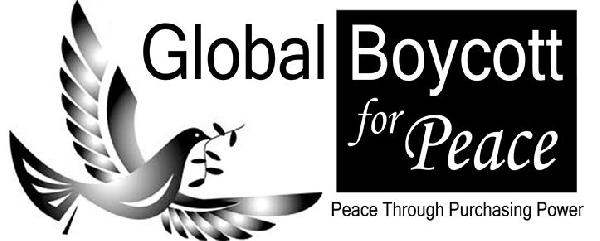
gbp.jpg, image/jpeg, 723x291
Don't let your money flow freely and ignorantly into the pockets of those whose actions you oppose. Find out more about the Global Boycott for Peace.
7 APRIL 2003
Global Boycott for Peace
Contacts:
Patrick Baggott (USA) 1-757-722-0188 pbaggott@cox.net
Sharyn Clarkson (New Zealand) ++64 2 564 4510 info@stopusa.org
Pattrice Jones (USA) 1-410-651-4934 pattrice@bravebirds.org
Cecilia Asuman Martone (Brasil) 55 16 632 23 74 martone@zaz.com.br
Clif Ross (USA) 1-510-215-8071 clifross1@yahoo.com
Liz Snyder (UK), +44 (0) 870 276 0463 esnyder@stopspending.org
Boycotts Brew as Baghdad Burns
In response to a war waged in opposition to worldwide public opinion, activists and regular citizens from Toledo to Tokyo are taking up the boycott in hopes of deterring the USA from continuing its attacks on Iraq.
Activist groups have organized some of the boycott efforts; others are direct expressions of public opinion.
Boycotts getting organized: many of the major boycott campaigns have banded together under the umbrella group the Global Boycott for Peace, or GBP.
Among the members of the GBP, boycott efforts have included:
Collectively, Global Boycott for Peace, along with For Mother Earth, is sponsoring its first day of direct boycott actions on April 15th 2003. Protesters around the globe will voice their plans to boycott at local shopping districts, gas stations, and strip malls across the globe.
Other boycotts include:
According to Pattrice Jones of IDEA, the boycott represents a form of nonviolent direct action. In contrast to symbolic demonstrations of opinion, boycotts have a direct and immediate impact on their targets. The idea behind the Global Boycott for Peace movement is that the Bush regime has listened to neither public opinion nor the United Nations, but is known to listen to US corporations. If the corporations begin to suffer, they will make their discomfort known to Bush, who will be compelled to alter his behavior accordingly. The growing international boycott movement is a grassroots phenomenon, with boycott websites and calls to action springing up spontaneously in diverse locations. Boycott strategies are also diverse, ranging from refusal to purchase any US or UK goods to ostracism of only those corporations known to support or likely to profit from the war. However, the recent formation of the Global Boycott for Peace foreshadows the formation of a large and sustained boycott emerging as the war in Iraq drags on.
American Liz Snyder of Stop Spending states, "I refuse to ignorantly put my money into the pockets of those whose actions I oppose. These companies made large contributions to the Bush administration, and they lobby this administration to make sure the government meets their needs. Let's make sure that what these companies need is an end to war against Iraq."
Even if that doesn't work, say some boycotters, they would still shun US goods and services in order to ensure that their own money doesn't help to pay for a war they consider to be illegal and immoral. When Tanzanian President Julius Nyerere took up the call to boycott goods coming from apartheid South Africa, he wrote: "Can we honestly condemn a system and at the same time employ it to produce goods which we buy, and then enjoy with a clear conscience?" Boycotters of the Global Boycott for Peace and across the world today are embracing the same philosophy, refusing to purchase the goods of a country whose actions, in good conscience, they cannot support.
Online sources of further information
International group for Direct Economic Action against war (IDEA) http://www.boycottwar.net
Adbusters http://www.adbusters.org
Be the Cause http://www.bethecause.org
BoycottUS http://www.boycottUS.net
Citoyens-Consommateurs Scandalises par la Politique Internationale des Etats-Unis http://users.skynet.be/plusdepetroleus/tracts.htm
Consumers Against War http://www.consumers-against-war.de
For Mother Earth http://www.motherearth.org/USboycott
Peace Action http://peace-action.inbyron.com
Peace Choice Campaign http://www.peace-choice.net/
Spend for Peace http://www.spendforpeace.co.nz
Stop Spending: Because War Doesn't Grow on Trees http://www.stopspending.org
Stop USA http://www.stopUSA.org
We Won't Shop Until Attack Talk Stops http://www.stopshopping.org/index.htm
News Articles referenced:
Africa South (October-December 1959) Letter to the Editor by Julius Nyerere
AP Newswire (28 Mar 2003) Information-technology tools aid anti-war rallies
AP Newswire (26 Mar 2003) Anti-war shopkeepers in Pakistan say they will boycott American goods
BBC News [UK] (1 April 2003) Anti-war boycott message spreads
The Boston Globe [USA] (23 Mar 2003) Soft-drink balancing
The Boston Globe [USA] (27 Mar 2003) Antiwar Europeans target US brands: Coke, McDonald's, others boycotted
CBC News [Canada] (26 Mar 2003) Consumers battle war through boycotts
News.Com.Au [Australia] (22 Mar 2003) Protesters burn flags, effigies
The New York Times [USA] (30 Mar 2003) McDonald's: When a Brand Becomes a Stand-In for a Nation
San Francisco Chronicle [USA] (31 Mar 2003) Coca-Cola disappears from menu as Europeans try to boycott U.S. goods
Terra Brasil [Brasil] (14 March 2003) Lançada campanha de boicote a produtos dos EUA